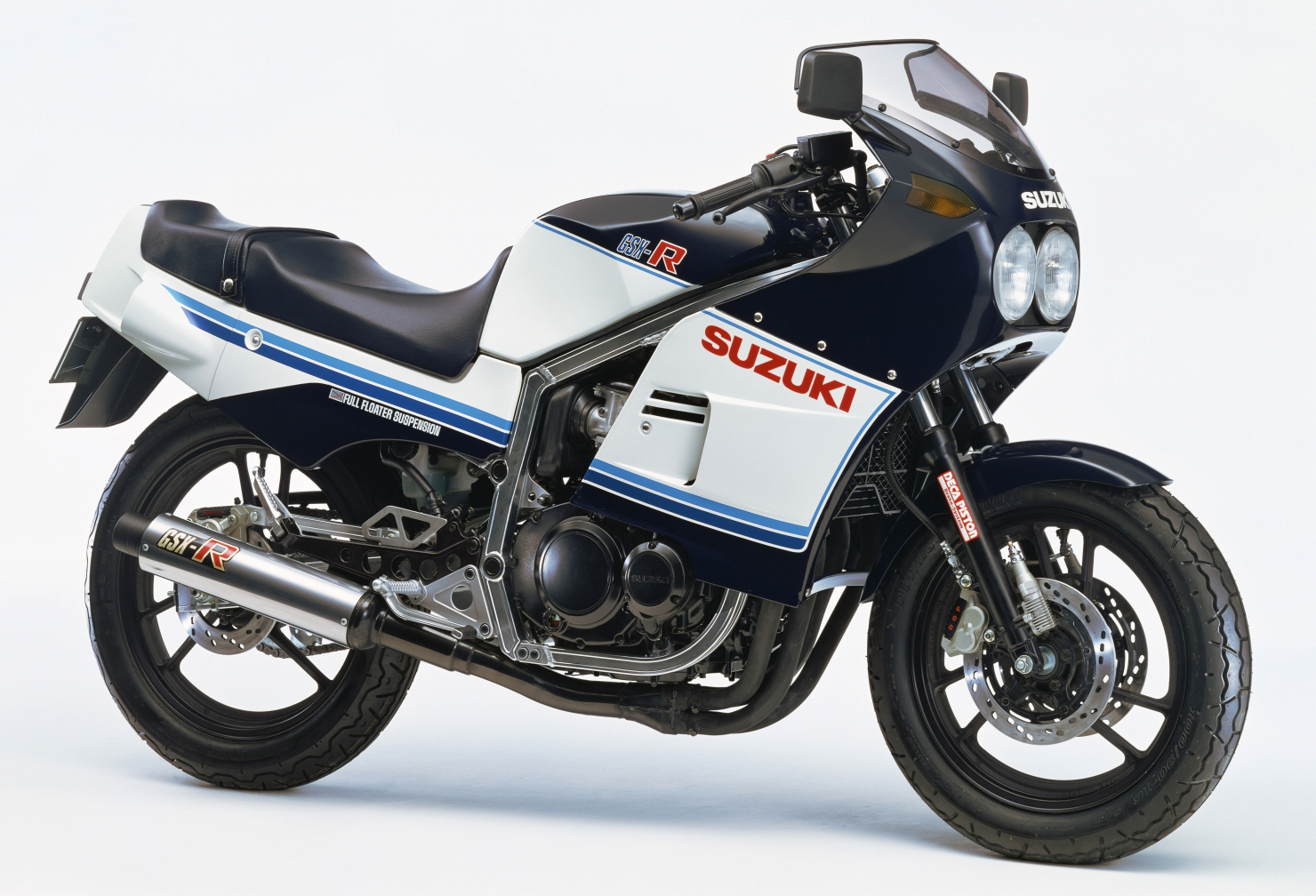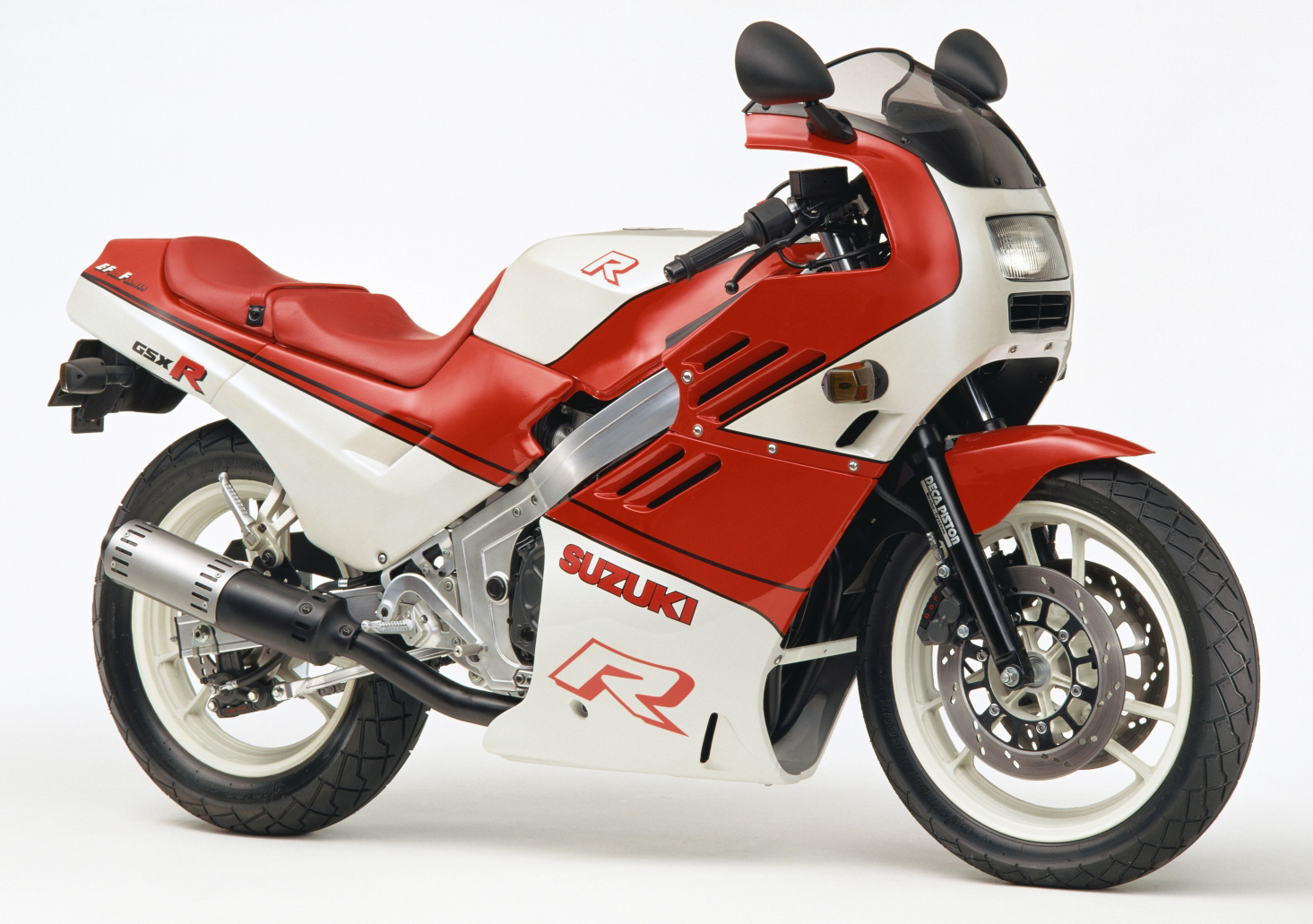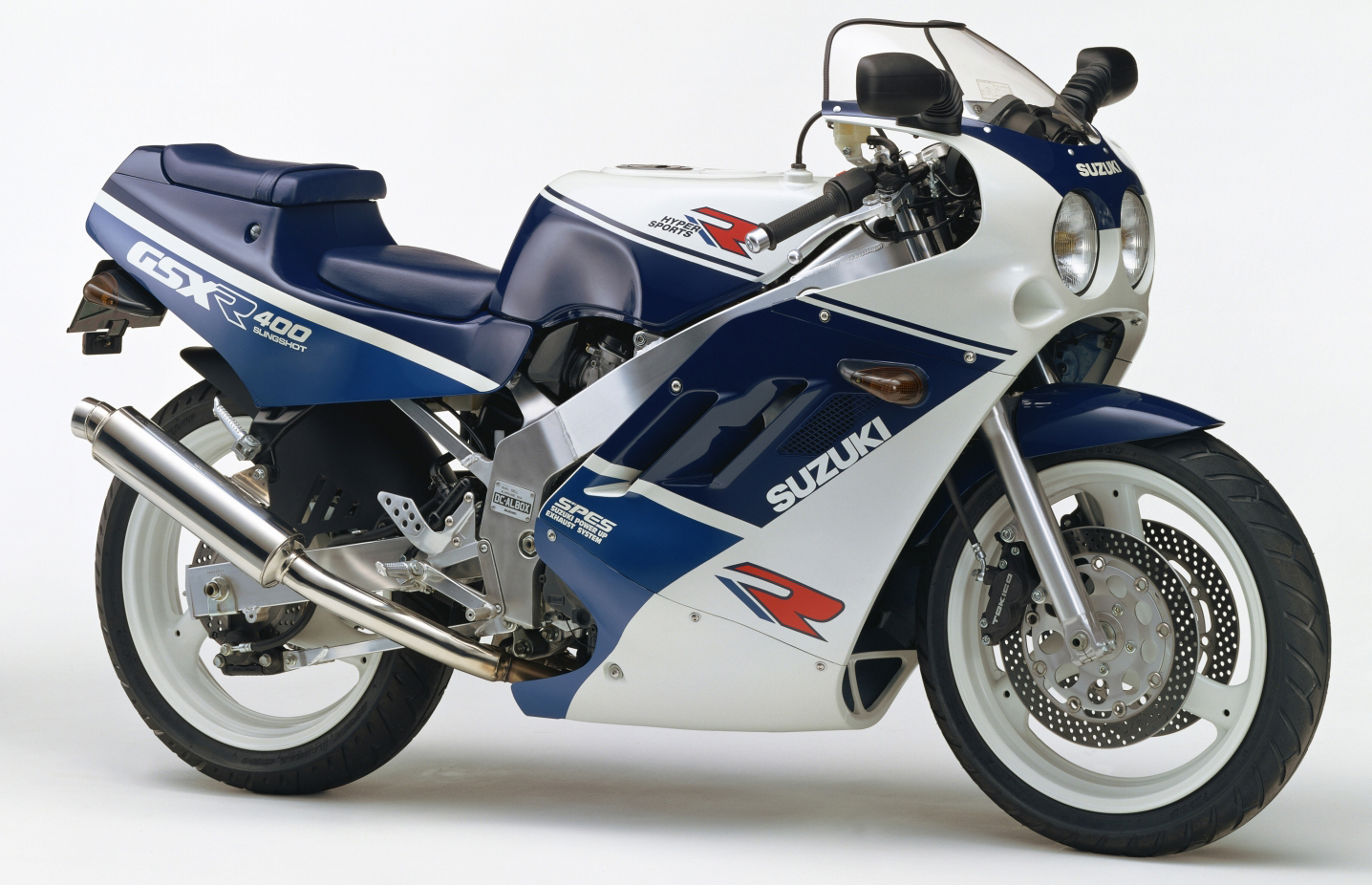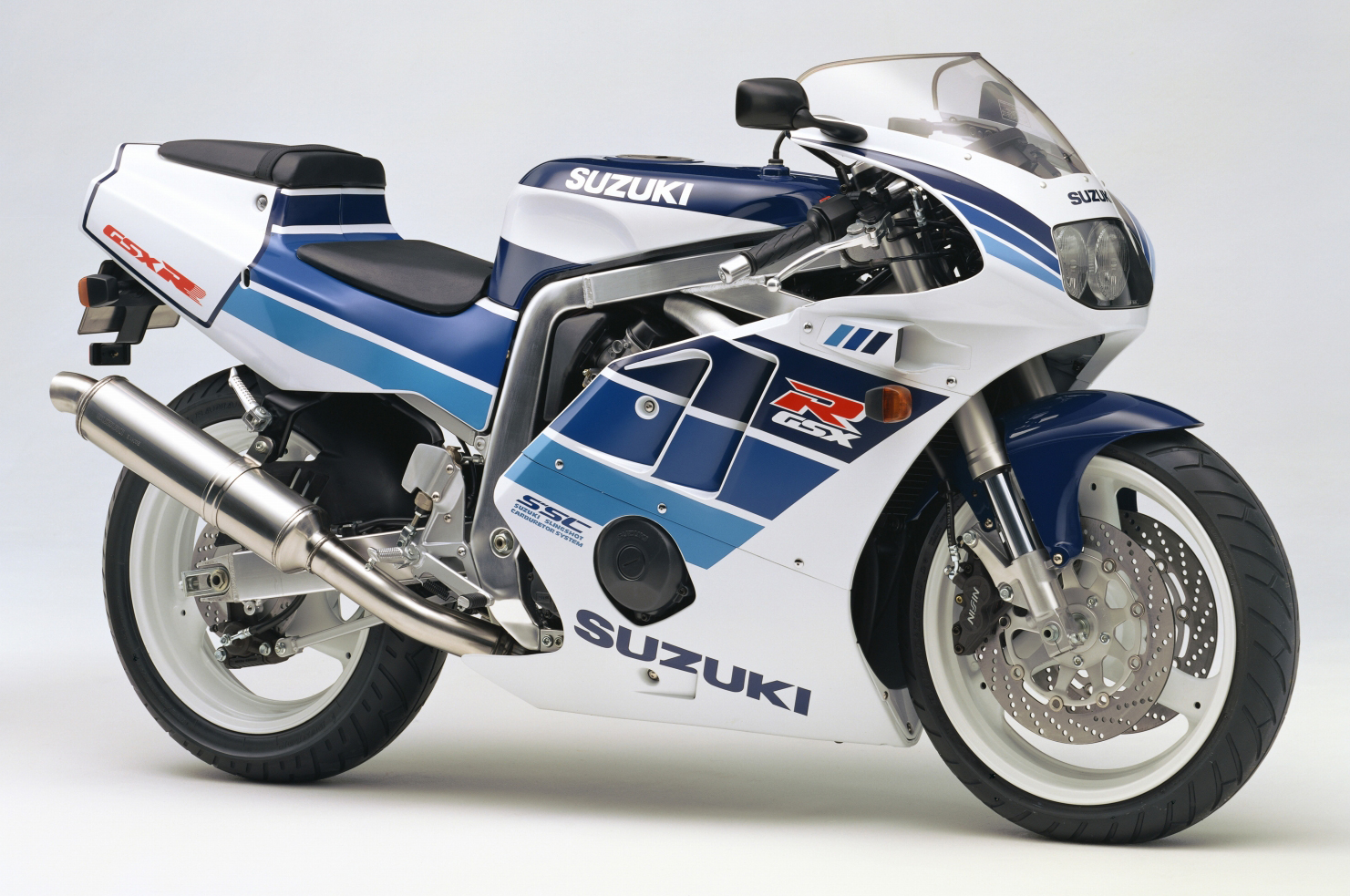1984 | GSX-R(400)
High-performance model with the pedigree of the GS1000R endurance racing machine

The GSX-R (400) is a convincing high-performance replica of the GS100R, the winner of the 1983 Endurance World Championship. The styling exactly replicates the dual-headlight and fairings as the championship winning bike. The liquid-cooled 4-stroke DOHC 4-valve 400 cm³ engine is equipped with new Twin Swirl Combustion Chambers (TSCCs) and generates maximum horsepower of 59 PS. This was realized by adopting small-diameter spark plugs that allow larger diameter intake and exhaust valves. Weight was reduced by the development of the aluminum multi-rib (MR) ALBOX frame with a new geometrical design. Thorough weight reduction efforts such as these result in a dry weight of only 152 kg. In addition, the GSX-R (400) is fully equipped with new technologies for outstanding riding performance. One example is the Deca Piston Brake System (DPBS), which generates powerful braking force through ten pistons at the front and rear wheels, and is the first such system installed on a mass production bike in the world.
| Dimensions and weight | Dimensions | Overall length | 2,090 mm |
| Overall width | 710 mm | ||
| Overall height | 1,185 mm | ||
| Wheelbase | 1,425 mm | ||
| Weight | 152 kg (Dry) | ||
| Engine | Engine type | 4-stroke, 4-cylinder, liquid-cooled, DOHC | |
| Engine displacement | 398 cm³ | ||
| Bore x stroke | 53.0 mm × 45.2 mm | ||
| Maximum power | 43.4kW(59PS) / 11,000rpm | ||
| Maximum torque | 39.2N-m / 9,000rpm | ||
| Transmission | 6-speed constant mesh | ||
| Front tire size | 100/90-16 54H | ||
| Rear tire size | 110/90-18 61H | ||
1986 | GSX-R(400)
Next-generation endurance model that extends the absolute range of performance

This full model change was designed to meet the needs of sporty model enthusiasts. The GSX-R (400) pairs the lightweight yet highly rigid Dual Cell-ALBOX Frame with a freshly engineered 4-stroke DOHC 400 cm³ engine equipped with the new Suzuki Advanced Three-way Cooling System (SATCS). This system helps to reduce the size of the engine while increasing cooling efficiency by liquid-cooling the cylinder head, air-cooling the cylinder block via fins, and oil-cooling the inside of the pistons. This model combines the Deca Piston Brake System (DPBS) of the previous generation with new floating torque links at the rear to realize a brake system with superb performance. The low center of gravity, mass centered between the wheels, and newly designed fairings that lower the frontal projection area help to both reduce air resistance at high speeds (CdA: 0.28) and enhance handling. Riders can choose between fully and half-faired styling depending on preference.
| Dimensions and weight | Dimensions | Overall length | 2,055 mm |
| Overall width | 680 mm | ||
| Overall height | 1,155 mm | ||
| Wheelbase | 1,400 mm | ||
| Weight | 153 kg (Dry) | ||
| Engine | Engine type | 4-stroke, 4-cylinder, liquid/oil/air-cooled, DOHC | |
| Engine displacement | 398 cm³ | ||
| Bore x stroke | 56.0 mm × 40.4 mm | ||
| Maximum power | 43.4kW(59PS) / 12,000rpm | ||
| Maximum torque | 37.3N-m / 10,500rpm | ||
| Transmission | 6-speed constant mesh | ||
| Front tire size | 100/80-17 57H | ||
| Rear tire size | 140/80-17 69H | ||
1988 | GSX-R400
Dramatic advancements that redefine the limits of displacement

This full model change features a range of substantial advancements from the previous model. The riding performance of the GSX-R400 was further enhanced by adopting a liquid-cooled 4-stroke DOHC 400 cm³ engine incorporating a wide range of upgrades throughout, the Suzuki Power-up Exhaust System (SPES) that increases low- to mid-range torque, and the newly designed Dual Cell-ALBOX Frame that is approximately 50% more rigid than the previous frame. In addition, the sport production version that debuted at the same time also features a close-ratio transmission, single seat fairing, inner rod type front forks with both rebound and compression adjusters, and separate-tank rear shock absorbers capable of adjusting both rebound and compression damping force.
| Dimensions and weight | Dimensions | Overall length | 1,995 mm |
| Overall width | 695 mm | ||
| Overall height | 1,110 mm | ||
| Wheelbase | 1,375 mm | ||
| Weight | 160 kg (Dry) | ||
| Engine | Engine type | 4-stroke, 4-cylinder, liquid-cooled, DOHC | |
| Engine displacement | 398 cm³ | ||
| Bore x stroke | 56.0 mm × 40.4 mm | ||
| Maximum power | 43.4kW(59PS) / 12,000rpm | ||
| Maximum torque | 38.2N-m / 10,500rpm | ||
| Transmission | 6-speed constant mesh | ||
| Front tire size | 110/70R17 53H | ||
| Rear tire size | 140/60R18 64H | ||
1990 | GSX-R400R
Featuring an impressive collection of innovative racing technologies

The GSX-R400R is noted for its aerodynamically sharp styling features, such as a compact dual-headlight with a built-in windscreen and strongly raked fairings. The R400R has the same aluminum double-cradle frame design of the GSX-R750, the top model of the series. The rigidity of this frame was increased and inverted front forks adopted for even greater stability. The valve train in the engine incorporates innovations such as independent rocker arms, and the intake system combines a straight intake with a downdraft slingshot carburetor for higher intake efficiency and response. The exhaust system also features a highly efficient manifold-type muffler. A production sport-spec model debuted at the same time.
| Dimensions and weight | Dimensions | Overall length | 1,995 mm |
| Overall width | 710 mm | ||
| Overall height | 1,060 mm | ||
| Wheelbase | 1,375 mm | ||
| Weight | 167 kg (Dry) | ||
| Engine | Engine type | 4-stroke, 4-cylinder, liquid-cooled, DOHC | |
| Engine displacement | 398 cm³ | ||
| Bore x stroke | 56.0 mm × 40.4 mm | ||
| Maximum power | 43.4kW(59PS) / 12,500rpm | ||
| Maximum torque | 39.2N-m / 10,000rpm | ||
| Transmission | 6-speed constant mesh | ||
| Front tire size | 120/60R17 55H | ||
| Rear tire size | 160/60R17 69H | ||
